Busan City Tour Bus Offers World of Fantastic Attractions
- Introduces double-deck buses, offers best service and discounts to tourist spots
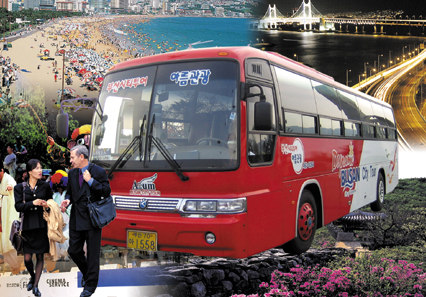
Busan, Korea's second largest city and southernmost port city, may be one of the nation's most dynamic metropolises as it is showing off many diverse natural attractions and glaring international and regional events filled with a load of thrill and fantasy.
The metropolis, a center of trade in the Pacific-rim area, has already established itself as a unique international tourist destination blessed with green mountains and rivers, and the blue sea in perfect harmony. Busan has the potential of becoming a Northeast Asian hub of tourism and logistics, as the city will be eventually linked with Eurasia by road or railroad overland in the future on top of its geographic vantage point to the sea.
To name a few charming natural wonders of the city, touted as a tourist paradise, there are the 1.5-km-long Haundae Beach, the jewel of Asia with romantic and scenic views, the Gwangan Grand Bridge, which overlooks such breathtaking spots as the endless sea, the Oruk Islets and its surrounding shorelines dotted with marvelous rocks and cliffs.
No wonder tourists can find a treasure of cultural heritage that still comes to life in the heart of the bustling metropolis, with the relics of a 5,000-year history dating back to the prehistoric age.
Busan offers diverse and unique features according to the change of the four seasons, providing a load of thrill and excitement with visitors virtually all year round.
The city is changing into a wondrous tourist's destination whenever it organizes numerous international regional festivals and events, many of which highlight regional points of interest or blend in the pristine conditions of nature. Among the festivals and events are the Pusan International Film Festival (PIFF), the Busan Biennale, the Busan International Rock Festival and the annual Busan Jagalchi Festival.
Busan is also a haven for offering diverse, exciting leisure and recreation activities day and night ranging from a casino to a mammoth aquarium. The metropolis is a shopper's paradise in which deluxe department stores, duty-free shops for global brands and traditional Korean markets are waiting for their customers.
One of the magnets for encouraging tourists to return to the port city is an array of items to eat, ranging from raw fish in the Jagalchi Market to its folk cuisine.
Busan has served as Korea's window to the world as BEXCO, an advanced exhibition and convention center with international standards, has become the venues of such much-publicized international events as the Final Draw for the 2002 FIFA World Cup Korea/Japan, the TPO General Assembly, the ICCA General Assembly and the ITU Telecom Asia 2004 as recently as last September.
The vitality and mystique of Busan will steal the international limelight again as the city plays host to the gathering of the leaders of the 21 members of APEC (Asia Pacific Economic Cooperation) slated for next November. Busan is also preparing for welcoming visitors with a warm heart with a myriad of surprises next year as the city celebrates "Visit Busan Year 2005."
In reality, the Busan tourism industry has been humming again with an upsurge despite the overall sagging economy, as the Korean Train Express (KTX), Korea's bullet train, which made its debut last April, has transformed Koreans' lifestyle by making their living sphere a half-day one. Each Busan City Tour Bus has witnessed the number of passengers climbing to an average of 75 from the previous 15, said Chon In-bok, director in charge of tourism at the Busan Metropolitan Government.
Imagine a couple in their 50s living in Seoul that embarks on a fancy one-day tour to Busan via the bullet train and return home later on the same day with the moving and memorable moments they enjoyed during a stroll at the Haeundae Beach or had mouthwatering raw fish and other regional cuisine at the Jalgalchi Market.
Under the concept, the Busan Metropolitan Government has been pitching for a one-day tour program from Seoul and other central areas capitalizing on the Seoul-Busan high-speed railway. Under the scenario, speaking specifically if the couple aboard a KTX bullet train at the Seoul Railroad Station at 9 a.m. in the morning, they can arrive at the Busan Railroad Station at 11:49 a.m., just in two hours and 49 minutes, where they are transferred to the awaiting Busan City Tour Bus, which takes them to the Jagalchi Market where they can sample such exotic cuisine as raw fish. Then, the bus will take the visitors to such fascinating attractions to the Busan Tower on Mt. Yongdu Park and the Haeundae Beach where they can make a romantic promenade. The couple could also choose a cruise ship to tour the Oruk Islands, dip your body in a hot spa to beat the chilly weather or have a dinner at a famous cow ribs eatery in Haeundae before winding up the fantastic tour to Busan and return to Seoul at 7 p.m. on the same day via the KTX, he explained.
Also recommended as a tour course for outside tourists, particularly younger couples is the soon-to-be launched a two-day, one-night cruise course. The PenStar, a cruise ship is scheduled to be put into commercial service on Dec. 18. The cruise tour, the first of its kind in Korea, is sure to provide tourists with an opportunity to make a fascinating sightseeing tour of the scenic spots of the sea of Busan, including the sunset of the Ulsuk Islands. The cruise tour starts at 3 p.m. on Saturdays and ends at 10 a.m. on Sundays.
As part of its strategy to capitalize on such mega-events as the APEC 2005 Korea, the Busan municipal administration has come up with incentives, refurbishing and other steps.
KTX passengers are given a 15 percent discount when they use the Busan City Tour Bus. Busan City Tour Bus tourists carrying KTX tickets also receive such benefits as a 20 percent discount to the entry fees of Busan Aquarium in Haeundae and cruise ship tour. The Busan City Tour buses will be replaced with double-deck ones from next year and a better service will be available with guides of the public address system of the bus being made in four foreign languages - English, Japanese, Chinese and Korean.
Busan metropolitan authorities aim to cash in on the APEC 2005 Korea and the "Visit Busan Year 2005" in a bid to raise its global profile.
Busan has also shifted into high gear in cooperating in the tourism sector among cities in the Asia-Pacific area. As part of efforts to secure the inter-city tourism network in the Asia-Pacific region, Busan hosted the first TPO (Tourism Promotion Organization for Asian-Pacific Cities) General Assembly in September of 2003. The TPO, established in August of 2002 with Busan taking the initiative, has evolved into an international institution with a membership of 45 key cities from 12 countries, including Korea, Japan and China, as well as 13 private organizations in a short period of time.
As part of its collaboration projects among the member cities, the TPO, headquartered in Busan, test-operated the Fukuoka-Busan - Shanghai cruise line between Sept. 18 and Sept. 24 this year. Citizens and municipal government officials from Fukuoka, Japan and Busan arrived in Shanghai via the cruise line and held their sessions aimed at publicizing their tourism resources and opportunities in the first experimental inter-city collaboration project termed as a success.
As recently as last Sept. 10, a tourism promotion consultation committee was inaugurated to promote collaboration between Busan and three provincial and city governments along the East Coast. Tourism bureau chiefs from Busan Metropolitan, Ulsan Metropolitan, North Gyeongsang Provincial and Gangwon Provincial governments, and other tourism-related figures participated in the inaugural session held at the Busan Lotte Hotel and discussed ways of promoting cooperation and development of tourism resources along the coastal area.
IntOl festivals
Each October, Busan is transformed into a city of international events highlighting the newest and most exotic tourist attractions.
For tourists in Busan every October there is a wonderful opportunity to visit the Jagalchi Market where they can explore the tastes and sights of the sea. The 2004 the Jagalchi Culture and Tourism Festival, which ran from Oct. 13 to Oct. 17, featured several programs on four stages, including eel and small octopus relay competitions and a contest for catching eel with bare hands. The Jagalchi festival celebrated its ninth year of operation in 2004.
The festival, designated as an important regional festival by the Korean Ministry of Culture and Tourism, has emerged as one of the nation's most famous festivals catering to international tourists. The festival has featured events such as a fishing rite of prayer for the safe return of fishermen with a full boat and a large-scale road play event called Gilnori.
One of every October's representative festivals is the Pusan International Film Festival, celebrating the 10th anniversary of its inception. In connection with the annual international film festival (PIFF), there are many frequented movie-related places like Cinematheque Pusan, Cine-Park and PIFF Plaza, loved by young people, especially during the PIFF. Among the favorite locations of hit movies are the streets from the Beomil-dong overpass to Samil Theater, designated as "The Street of Friend" in celebration of the Korean film "Friend" and the "40 steps" located in Jungang-dong, the scene of the famous film "Sympathy and Reason Are Out of Mind."
The PIFF has become one of the world's top eight international film festivals and the best in Asia. Busan's bid to establish itself as the center of Korea's movie industry, combined with the citizen's enthusiastic interest and contributions, has contributed to making the PIFF a success.
The 2004 Pusan International Film Festival featured 266 works from 63 countries, the largest in its nine-year history. The annual film festival closed its curtain with the screening of "The Scarlet Letter," a Korean romantic thriller by Daniel Byun.
Organizers claimed that the festival attracted some 160,000 moviegoers. The 2004 PIFF witnessed 39 films make their world premiers, reflecting the festival's rising influence in the cinema world.
Haeundae Course
(Camellia Line Course)
* Gwangan Grand Bridge
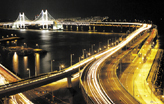 The Gwangan Grand Bridge, the 7.42 km-long duplex truss bridge, is the country's longest suspension bridge, and the endless sea, the Oruk (Five or Six) Islets at close hand, Mt. Hwangnyeong surrounding the Bridge, the fascinating white sandy beach, the fascinating white sand beach, Dongbaek Island of Haeundae and Dalmaji (Moon-viewing) Hill are seen at a glance.
The Gwangan Grand Bridge, the 7.42 km-long duplex truss bridge, is the country's longest suspension bridge, and the endless sea, the Oruk (Five or Six) Islets at close hand, Mt. Hwangnyeong surrounding the Bridge, the fascinating white sandy beach, the fascinating white sand beach, Dongbaek Island of Haeundae and Dalmaji (Moon-viewing) Hill are seen at a glance.
* Haeundae Beach
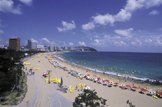 The 1.5 km-long Haeundae Beach, the nation's largest one with total area of 82,000 square meters, is studded with the endless stunning scenery. It is an international standard resort equipped with convenient transportation network and the super-deluxe accommodation. Dongbaek Island, Haeundae Spa, Busan Aquarium and Dalmaji Hill, etc., will remain the wonderful vistas. Enjoy the fantastic shorelines aboard the sightseeing cruise at Mipo Wharf and also enjoy casino games at the Paradise Hotel & Casino Busan.
The 1.5 km-long Haeundae Beach, the nation's largest one with total area of 82,000 square meters, is studded with the endless stunning scenery. It is an international standard resort equipped with convenient transportation network and the super-deluxe accommodation. Dongbaek Island, Haeundae Spa, Busan Aquarium and Dalmaji Hill, etc., will remain the wonderful vistas. Enjoy the fantastic shorelines aboard the sightseeing cruise at Mipo Wharf and also enjoy casino games at the Paradise Hotel & Casino Busan.
* Gwangalli Beach
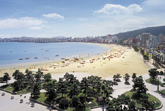 The 1.4 km-long Gwangalli Beach with total area of 82,000 square meters is a semicircular beach, and the seaside them street, the open-air cafe street, the waterfront park and the sliced raw fish center are located in the vicinity of the white sandy plain, and the Gwangan Grand Bridge, the pride of Busan, stands offshore. The regular stage is established in the white sandy plain, holding various performances and events in succession.
The 1.4 km-long Gwangalli Beach with total area of 82,000 square meters is a semicircular beach, and the seaside them street, the open-air cafe street, the waterfront park and the sliced raw fish center are located in the vicinity of the white sandy plain, and the Gwangan Grand Bridge, the pride of Busan, stands offshore. The regular stage is established in the white sandy plain, holding various performances and events in succession.
* BEXCO
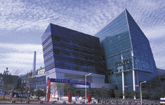 The BEXCO, constructed in May 2001, is the international standard, state-of-the-art exhibition & convention facilities equipped with one floor under the ground and seven floors above the ground. Following the opening of the Final Draw for the 2002 FIFA World Cup Korea/Japan, the TPO General Assembly and the ICCA General Assembly, etc. drew the wide attention from all over the world.
The BEXCO, constructed in May 2001, is the international standard, state-of-the-art exhibition & convention facilities equipped with one floor under the ground and seven floors above the ground. Following the opening of the Final Draw for the 2002 FIFA World Cup Korea/Japan, the TPO General Assembly and the ICCA General Assembly, etc. drew the wide attention from all over the world.
* UN Memorial Cemetery
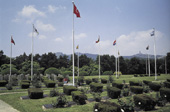 The UN Memorial Cemetery is the unique cemetery in the world, designated by the United Nations to pay tribute to those who were killed in action during the Korean War (1950-53). The cemetery has become a permanent resting place of 2,300 war heroes form the 11 countries.
The UN Memorial Cemetery is the unique cemetery in the world, designated by the United Nations to pay tribute to those who were killed in action during the Korean War (1950-53). The cemetery has become a permanent resting place of 2,300 war heroes form the 11 countries.
* Busan Museum
 The Busan Museum, opened in 1978, houses some 20,000 artifacts from the Prehistoric Age to the present. Among them, some 1,500 artifacts, including the Gilt-Bronze Standing Bodhisattva Statue (National Treasure No. 200), are on display.
The Busan Museum, opened in 1978, houses some 20,000 artifacts from the Prehistoric Age to the present. Among them, some 1,500 artifacts, including the Gilt-Bronze Standing Bodhisattva Statue (National Treasure No. 200), are on display.
Taejongdae Course
(Sea Gull Line Course)
* Busan Tower (Mt. Yongdu Park)
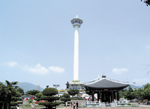 The name of Yongdu derived from a shape of the mountain similar to a dragon's head soaring to the land from the sea. People can overlook the complete view of Busan Port from the 120-meter-high Busan Tower, the symbol of Busan. There is the Bell of Busan Citizens donated by Busan citizens, and Gwangbok-no and the Fashion Street are situated in the vicinity of the park.
The name of Yongdu derived from a shape of the mountain similar to a dragon's head soaring to the land from the sea. People can overlook the complete view of Busan Port from the 120-meter-high Busan Tower, the symbol of Busan. There is the Bell of Busan Citizens donated by Busan citizens, and Gwangbok-no and the Fashion Street are situated in the vicinity of the park.
* Taejongdae
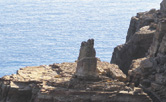 The name of Taejongdae derived form the fact that King Taejong Muyeol, the 29th king of the Silla Kingdom, practiced the archery here for recreation. The God-given unspoilt scenery is unrivaled anywhere in good harmony with thick woods, rough mystique rocks and blue waves. Don't miss the scenery aboard the super sightseeing cruise at Pebble Yard and Lighthouse, and Jayu Land will amuse you.
The name of Taejongdae derived form the fact that King Taejong Muyeol, the 29th king of the Silla Kingdom, practiced the archery here for recreation. The God-given unspoilt scenery is unrivaled anywhere in good harmony with thick woods, rough mystique rocks and blue waves. Don't miss the scenery aboard the super sightseeing cruise at Pebble Yard and Lighthouse, and Jayu Land will amuse you.
* PIFF Square
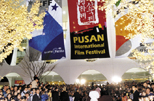 Following the opening of the 1st Pusan International Film Festival (PIFF) in 1996, a part of Nampo-dong and Chungmu-dong Cinema Streets were designated as the PIFF Square, and the cooper plates printed with hands and feet of awardees as well as the names of the entry works are put on the Square floor every year.
Following the opening of the 1st Pusan International Film Festival (PIFF) in 1996, a part of Nampo-dong and Chungmu-dong Cinema Streets were designated as the PIFF Square, and the cooper plates printed with hands and feet of awardees as well as the names of the entry works are put on the Square floor every year.
* Gukje Market
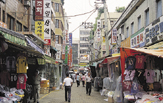 Gukje Market is a symbolic place which made Busan the country's largest-scale commercial city. It is a traditional market where various imported goods are traded on the cheap prices, and various sights and eateries such as Kkangtong (canned goods) Avenue, and Jokbal (pork hock) Avenue are clustered.
Gukje Market is a symbolic place which made Busan the country's largest-scale commercial city. It is a traditional market where various imported goods are traded on the cheap prices, and various sights and eateries such as Kkangtong (canned goods) Avenue, and Jokbal (pork hock) Avenue are clustered.
* Choryang Foreigner Street
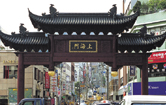 Qingquan was constructed on this place. The Shanghai Gate was built here in commemoration of the ties with Shanghai and now it is famous for the shopping street for foreigners, particularly Russians.
Qingquan was constructed on this place. The Shanghai Gate was built here in commemoration of the ties with Shanghai and now it is famous for the shopping street for foreigners, particularly Russians.
* Jagalchi Market
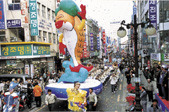 Jagalchi Market, opened in 1970 in the form of Busan Fish and Shellfish Cooperative, is Korea's largest seafood market featuring the flavor of Busan. The Jagalchi Culture and Tourism Festival, the country's largest seafood festival, is held in October every year.
Jagalchi Market, opened in 1970 in the form of Busan Fish and Shellfish Cooperative, is Korea's largest seafood market featuring the flavor of Busan. The Jagalchi Culture and Tourism Festival, the country's largest seafood festival, is held in October every year.
For more information call Busan City Tour at 051-463-8804 or log on
www.busancitytour.com nw
3Fl, 292-47, Shindang 6-dong, Chung-gu, Seoul, Korea 100-456
Tel : 82-2-2235-6114 / Fax : 82-2-2235-0799